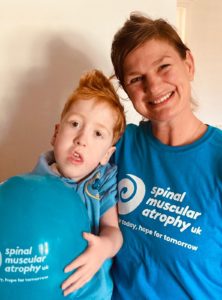Ezra’s story
Ezra’s story
Ezra is one of the first generation of SMA Type 1 children to make it beyond the first years of infancy. Born in November 2016 to parents Portia and Dan, who had no history of genetic conditions in either family, Ezra’s birth was completely normal and he was brought home to meet his three older sisters. 
Just one month later in December 2016, after a week spent in his local hospital, Ezra was admitted to Paediatric Intensive Care (PICU) in London in respiratory distress and required a ventilator to keep him alive. He had caught the common cold, but his lungs had filled up with liquid and collapsed as his respiratory muscles were not strong enough to clear his mucus.
After several weeks of life support, they tried to take Ezra off the ventilator. He only managed to breathe by himself for about 4 hours before having to be re-intubated and so spent his first Christmas in PICU. Dan and Portia stayed with him whilst their three girls celebrated with their Grandparents. After Ezra was successfully taken off life support, a PICU nurse reported back to the consultants that he had very low muscle tone, he didn’t seem to be moving very much at all. This was not investigated any further.
In the new year he was well enough to breath by himself and was discharged. At home Portia and Dan noticed a severe deterioration in Ezra’s physical condition, especially his motor skills. He couldn’t move his legs or bear any weight; he couldn’t hold the weight of his own head or lift his dummy to his mouth and started choking on his milk. Portia knew something was not right but three separate Health visitors put his condition down to his recent illness, he even passed his very delayed eight week check with the GP because he was so bright and alert cognitively. Finally after three months of fighting, in March 2017, when Ezra was 4 months old, the family got a referral and were told that Ezra had SMA Type 1. But he had a very severe, fast progressing form of the disease, damage had already been done. Once the neurons have died in the body, they don’t come back.
There were no treatments for SMA funded by the NHS in the UK at this time and the family were told that due to Ezra’s symptoms being so severe, he would probably die before he was one year old.
However, there was hope.
Although treatments were not available on the NHS, Ezra could receive one through what is known as an Expanded Access Programme for children with SMA Type 1 and at 6 months old, in May 2017, he received his first dose of one of the drug Spinraza. By this point he could only move his forearms. The drug is administered directly into his cerebrospinal fluid via intrathecal injection and Ezra will have to have this invasive injection three times a year for the rest of his life.
Over the next 3 years Ezra had 10 long admissions to PICU where he was intubated and ventilated and now, aged 5 he has NHS funded 12-hour nursing care overnight and 8 hours 1:1 nursing at school. He is reliant on a bi-pap ventilator when he sleeps. He cannot eat or drink orally, all his hydration and nutrition comes through his gastrostomy. He has respiratory physiotherapy sessions everyday using a cough assist machine and suctioning machine to keep his airways and his lungs clear of secretions.
Despite all of this, thanks to Ezra having treatment when he did, he now attends mainstream school, he drives a power chair and is beginning to read and write. His speech is limited due to his weak facial muscles, but he is improving all the time, he is a comic genius and has quite a command of the English language!